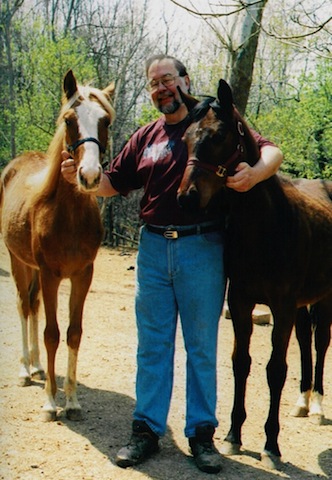
John Holland, president of the Equine Welfare Alliance, is optimistic that horse slaughter plants will not open on American soil.
The term Omnibus Budget is not exactly a sizzling conversation starter.
And the process of creating the over-arching spending bill that sets budgets for many United States government departments is equally, ah, scintillating, says Equine Welfare Alliance President John Holland.
Yet, the FY 2014 Omnibus Budget, approved by both the House and the Senate, contains language in it that is arguably the most exciting thing to come down the pike for horse-slaughter opponents in a long, long time, Holland says.
In this week’s Clubhouse Q&A, Holland explains why he has reason to hope the “fat lady has sung” with regard to horse slaughter on American soil, and that, at least for now, it appears that this gargantuan budget does something that many horse lovers have been praying for: it blocks horse slaughter plants from opening on US soil.
Q: Please explain how the FY 2014 Omnibus budget diminishes the possibility of horse-slaughter plants re-opening on American soil.
What happened was that the Agricultural Appropriations Committee in the House and the Senate both passed de-funding language by a super majority, which removes funding for meat inspectors at horse slaughterhouses.
Nobody was sure whether the de-funding language would make it into the Omnibus, but Joe Biden stepped in and turned people around, getting them to vote to keep it in.
Q: Funding language in the Omnibus is good for a year, after which, new votes could be taken. Please explain why you are so confident that a definite blow has been struck against a move to restore horse slaughterhouses in the US?
First of all, Democrats and Republicans agreed that there would be a two-year framework in which to keep the de-funding language in tact. But there’s something else that presents a huge stumbling block for slaughterhouse proponents: The EU, which is the major importer of horse meat, recently changed its rules and requirements for meat imports, and the USDA has not yet re-qualified under the new rules and restrictions. In other words, even if the Omnibus was to re-fund meat inspection at horse slaughter plants, the USDA stamp of approval would not qualify the meat to be imported into the EU.
Q: There was a hiccup in the de-funding language a couple years ago, which gave slaughterhouse proponents leverage in their attempt to gain a foothold on American soil and resume slaughtering horses in the US.
The de-funding of meat inspectors remained in the budget until 2011; it was carried over in new budgets, year after year, via a mechanism called a continuing resolution. Then two things happened in quick succession.
First, a report was issued from the General Accountability Office, which studied the effects of closure of domestic horse slaughter. The report stated, ultimately, that horse welfare was impacted negatively by the closure of slaughterhouses. Among other findings, it reported that the value and price of horses had been depressed due to the closures, and because horses were less valuable, people were not taking as good care of their animals. Many questioned the legitimacy of this report, however, it helped horse-slaughter proponents. The second thing that happened was that later, when the de-funding language came up in the agricultural appropriations committee, while the House-side kept it, the Senate removed it, and ultimately, the language de-funding meat inspectors at horse slaughterhouses was left out of the FY 2012 budget.
Q: Why do we have federal meat inspectors at slaughterhouses?
The Federal Meat Inspection Act was passed in the 1940s to improve sanitary conditions in meatpacking plants. Remember the book The Jungle, by Upton Sinclair? The book exposed unsanitary conditions and hazards in the meatpacking industry at a time when meatpacking plants were paying for private inspections. Since the law was passed, meat cannot be processed for human consumption without federal inspection.



P. Ahlberger,
There is solid data showing that the “unwanted horse” argument is deceptive. The average age of slaughter horses is less than five years and some recent data puts it at three. For the most part, they are sport horses who showed little or no promise and are dumped so that the “lotto breeding” can keep going.
As to the difference between horses and domestic meat animals like bulls, pigs and chickens is largely that our culture regards them as companion animals, but more importantly they are not raised as food animals and are given many drugs that are forbidden in animals intended for food.
However, you make a reasonable point. That is why I became a vegetarian the day I visited a horse slaughter plant.
Now THIS is no horse slaughter debate is old and terribly hypocritical.
There ARE horses that noone wants and there are so many that not all of them can’t find homes or places in a sanctuary. Is it better when theose starve somewhere because of neglect?
Now why is it worse to slaughter a horse than slaughtering a healthy young bull, pig or chicken?
P. Ahlberger,
Just for the sake of clarification: It’s not a debate, it’s a Q&A (Question and Answer) interview with a man who has devoted a good part of his life to fighting horse slaughter. So there’s no “debate” between those on the pro and those on the con. In the news biz, this is what they call an “explainer piece,” which is simply describing the facts of where the meat-inspection stands in the Omnibus spending bill in Washington, and an additional fact of new rules in the European Community. Sorry for the confusion! Q&As, whether they’re with quarterbacks, ballerinas, politicians, or in this case, the president of the Equine Welfare Alliance, an anti-slaughter group, are, by their nature, a feature interview. Hope that clarifies things. Best, Sue Salk
As far as I know there are people in Canada that are raising horses for slaughter.
That is something I heard about last year. They seem to be breeding the draft horses because of their large size and these places are scattered everywhere. The draft horses are the ones being flown to Japan for slaughter. They are shipped in boxes that don’t have enough headroom for these large horses. This information comes from Defend Horses Canada. Also I doubt Canada will ever stop slaughtering horses there is to much money involved in it. But if the US bans our horses from ending up in the slaughter pipeline that will shut down most of the slaughter plants in Canada and Mexico. But Canada could keep slaughtering their own homegrown horses if they could raise enough of them to supply a slaughter plant. Which I would be skeptical of because if the EU horse meat orders dropped because of the populations in many EU countries were not eating much horse meat anymore that would put the breeders out of business overnight.
I hope that Vice Pres Joe Biden will step in and encourage the members of the Senate to to bring S.541 out of committee and vote on it. There are enough cosponsors in the House at “168” to pass H.R.1094 now.
Wonderful Q&A! One aspect not mentioned in the short space is that there are no FDA protocols for horse meat for US inspectors to follow. The FDA does not recognize horse meat as a meat for human consumption, so what would US inspectors compare it to? The EU doesn’t allow human consumption of the 100 or so drugs administered to horses in this country, so what would the outcome be? Horses would have to be raised specifically for eating. Not likely!